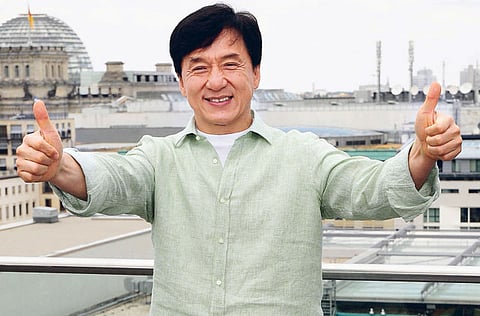Decoding Jackie Chan's curse
How do you market yourself in a nation of 1.3 billion? Jackie Chan's using product endorsements - but he may have rushed into some

Judging from billboards and television commercials in China, film star Jackie Chan has never met a product he wouldn't endorse.
Travel the country and you'll see the Hong Kong native's handsome visage hawking electric bikes, anti-virus software, even frozen dumplings. But although the Chan name has translated to big bucks at the box office, not every product he touches turns to gold.
In fact, when news broke in July that an anti-hair-loss shampoo he promoted allegedly contained carcinogens, Chinese cyberspace and media were buzzing about the "Jackie Chan curse". Consider the auto repair school that Chan plugged to aspiring Chinese mechanics: It became enmeshed in a diploma scandal.
Another of his sponsors, a maker of video compact discs, went bankrupt and saw its manager jailed for fraud.
An educational computer that Chan pitched to children called the Subor Learning Machine flopped. And a cola he quaffed named Fenhuang fizzled.
More recently, an air-conditioner brand that Chan promoted was hit by a report that one of its units exploded. Media wags couldn't resist invoking the Jackie jinx.
"He has become the coolest spokesperson in history," said an editorial in Oriental Guardian, a Nanjing newspaper. "A man who can destroy anything."
In the US, companies have learned the hard way about the risks of using celebrities to pitch their products. Philandering cost Los Angeles Lakers star Kobe Bryant and golfer Tiger Woods millions in lost endorsements.
But rather than personal scandals, Chan's difficulties stem from his willingness to shill just about anything, including well-known global brands (Canon cameras), obscure regional products (Sinian sticky rice balls) and so much more (Hong Kong tourism). His seeming lack of discrimination has made it more likely that he would pitch some clunkers, analysts said.
Clear of controversy
"When you have someone with so many brands, the probability of things going wrong is markedly higher," said Saurabh Sharma, a strategic planning director for Ogilvy & Mather Beijing. "It's rare to be in the industry for so long and also be clear of controversy." Chan's representative said the 56-year-old actor was not available for comment.
Experts said it was unlikely the recent shampoo setback would do anything to harm the entertainer's appeal to advertisers, who know that Chan's signature smile and voluminous side-swept hair are recognisable from Shanghai to Tibet. (Plus, he's huge in Japan.) Chan is believed to have at least two dozen endorsement contracts at present.
Entrgroup.com, a popular Chinese entertainment website, ranked Chan the nation's most powerful celebrity brand for his fan appeal, charity work and overall marketability.
Some US celebrities limit their product endorsements to enhance their aura of exclusivity, but experts said China's media market is still too small, and the country too big, to worry that Chan will suffer from overexposure. "Generally, in a country of 1.3 billion people, celebrities want as much exposure as possible," said Tiger Hou, an analyst for Entrgroup.com.
Born in Hong Kong when it was still a British colony, Chan got his start in the island's film industry as an extra in martial arts movies, rising to stardom as an actor, director and singer. His Hollywood breakout came in 1998 with the blockbuster buddy-cop movie Rush Hour. Chan in recent years has focused his efforts on the mainland Chinese market. His status as a cultural icon was cemented when he sang at the closing ceremony of the 2008 Olympic Games in Beijing.
Chan is believed to have at least two dozen endorsement contracts at present. Entrgroup.com ranked Chan China's most powerful celebrity brand.
Sign up for the Daily Briefing
Get the latest news and updates straight to your inbox



